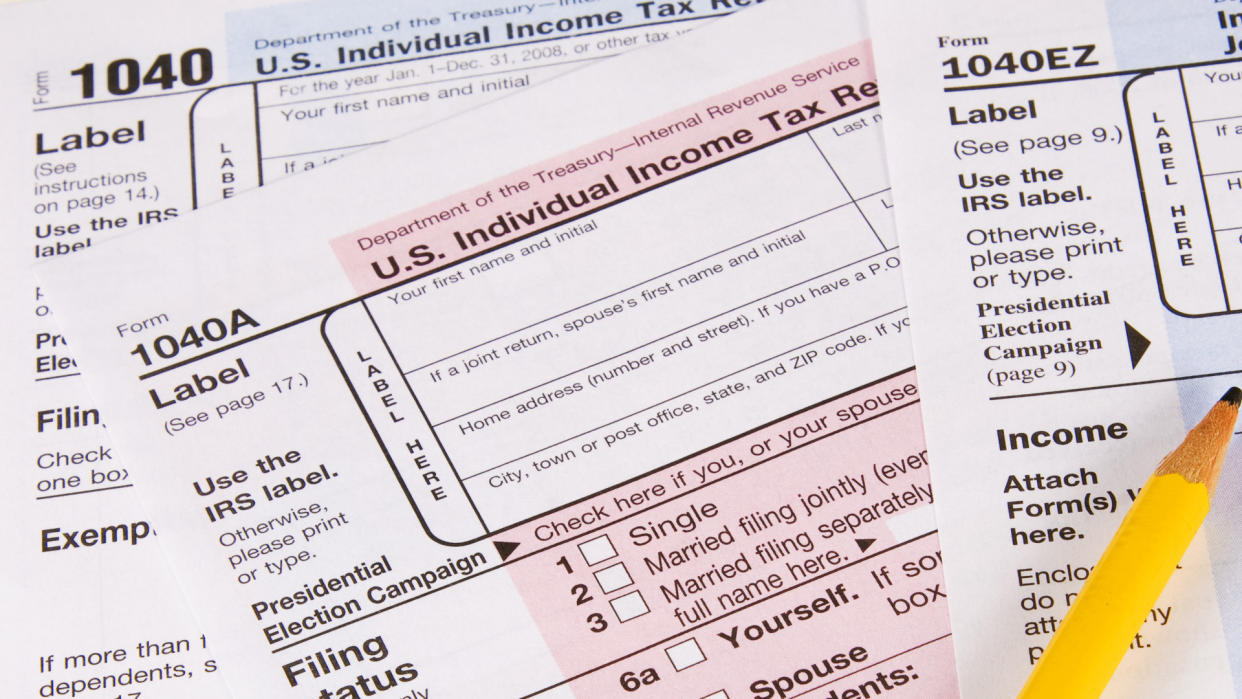What Is the Difference Between Tax Forms 1040, 1040A and 1040EZ?

Tax time can be stressful, and for many, the headaches start with trying to figure out which forms to use. Everyone required to file an individual federal income tax return must use Internal Revenue Service tax Form 1040, or one of its shorter versions, such as Form 1040EZ or Form 1040A.
Various income levels require you use different tax forms. So you can better choose the right one for your situation, understand the most commonly used tax forms.
Difference Between Tax Forms 1040, 1040A and 1040EZ
The difference between these federal income tax forms is the relative simplicity of short forms 1040EZ and 1040A — compared to the longer, more complex Form 1040. Using the shorter tax forms can simplify your tax preparation. Each of these tax forms has the same set of purposes, including:
Reporting your income
Applying for tax exemptions
Determining whether you owe additional taxes
Determining whether you are entitled to a tax refund
Related: 31 Tips When Doing Your Own Taxes
Before you settle on any tax form, figure out which one is right for your financial circumstance. Here’s the difference between tax forms 1040, 1040A and 1040EZ:
Form 1040
Anyone can use Form 1040, regardless of whether they qualify to use the 1040EZ or 1040A. If you are self-employed, itemize your deductions, owe household employment tax or have $100,000 or more in taxable income, you must use Form 1040, according to the IRS. To help you determine the simplest federal income tax form you can use to file your taxes, try the IRS online tool provided on the IRS website.
Form 1040A
Although it’s longer than Form 1040EZ, Form 1040A is shorter than the 1040 tax form, and it allows you to claim certain adjustments not available using Form 1040EZ. For example, Form 1040A can be used to file as head of household, which is more advantageous than a filing status of single. You can also claim dependents and take tax credits for child and dependent care, retirement savings, earned income, premium tax and education using Form 1040A.
As with Form 1040EZ, you can only use Form 1040A if your taxable income is less than $100,000. Other income requirements for Form 1040A differ from 1040EZ in that they allow you to include a broader category of income. In addition to wages, salary and tips, for example, your income can include dividends, pensions, annuities, IRAs and capital gains distributions. Another difference is that the 1040EZ form’s $1,500 limit on interest income does not apply to Form 1040A.
The most significant limiting factor with Form 1040A is that you cannot itemize your deductions, so you must take the standard deduction. This means you can’t write off charitable contributions, mortgage interest, medical expenses or business expenses.
Learn Now: Best and Worst Ways to Itemize Your Taxes
Form 1040EZ
As the name implies, Form 1040EZ is the easiest federal income tax form to complete, but it also has the most conditions and restrictions on its use. Here’s a checklist the IRS uses to determine whether you qualify to file Form 1040EZ:
You file your income tax return with a status of single or married filing jointly
Your taxable income is $100,000 or less
All of your taxable income comes from wages, salary, tips, interest income amounting to less than $1,500, taxable scholarship and fellowship grants, unemployment compensation or Alaska Permanent Fund dividends
Boxes 5 and 7 of your Form W-2 contain any tips you earned
On the last day of the tax year, you were under age 65 and you were not blind (this also applies to your spouse if you file jointly)
You aren’t required to pay household employment tax on household employees’ wages
You didn’t become a Chapter 11 bankruptcy debtor after October 16, 2005
Premium tax credits weren’t paid on your behalf or on behalf of your spouse, or on any individual, you enrolled in coverage for whom no one else is claiming the personal exemption
Unless you meet each of these conditions, you cannot use Form 1040EZ. Even if you do meet these conditions, you cannot use Form 1040EZ and claim any dependents or itemized deductions. You also cannot claim tax credits other than the earned income tax credit, or claim adjustments to income such as contributions to an IRA. To benefit from claiming dependents, deductions or adjustments and credits, you must use Form 1040A or 1040.
Up Next: Every Tax-Filing Status Explained
This article originally appeared on GOBankingRates.com: What Is the Difference Between Tax Forms 1040, 1040A and 1040EZ?
